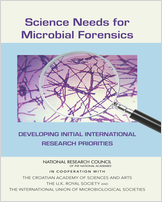NCBI Bookshelf. A service of the National Library of Medicine, National Institutes of Health.
Microbial forensics is a scientific discipline dedicated to analyzing evidence from a bioterrorism act, biocrime, or inadvertent microorganism or toxin release for attribution purposes. This emerging discipline seeks to offer investigators the tools and techniques to support efforts to identify the source of a biological threat agent and attribute a biothreat act to a particular person or group. Microbial forensics is still in the early stages of development and faces substantial scientific challenges to continue to build capacity.
The unlawful use of biological agents poses substantial dangers to individuals, public health, the environment, the economies of nations, and global peace. It also is likely that scientific, political, and media-based controversy will surround any investigation of the alleged use of a biological agent, and can be expected to affect significantly the role that scientific information or evidence can play. For these reasons, building awareness of and capacity in microbial forensics can assist in our understanding of what may have occurred during a biothreat event, and international collaborations that engage the broader scientific and policy-making communities are likely to strengthen our microbial forensics capabilities. One goal would be to create a shared technical understanding of the possibilities—and limitations—of the scientific bases for microbial forensics analysis.
Science Needs for Microbial Forensics: Developing Initial International Research Priorities, based partly on a workshop held in Zabgreb, Croatia in 2013, identifies scientific needs that must be addressed to improve the capabilities of microbial forensics to investigate infectious disease outbreaks and provide evidence of sufficient quality to support legal proceedings and the development of government policies. This report discusses issues of sampling, validation, data sharing, reference collection, research priorities, global disease monitoring, and training and education to promote international collaboration and further advance the field.
Contents
- THE NATIONAL ACADEMIES
- COMMITTEE ON SCIENCE NEEDS FOR MICROBIAL FORENSICS: DEVELOPING AN INITIAL INTERNATIONAL ROADMAP
- BOARD ON LIFE SCIENCES
- Preface
- Acknowledgments
- List of Acronyms and Initialisms
- Summary
- 1. Introduction: What Is Microbial Forensics and Why Is It Important
- 2. Microbial Science: Ecology, Diversity, and Characterizing the Microbial World
- 3. Microbial Forensics and Clinical and Public Health Considerations: Commonalities and Differences
- 4. Clinical and Forensic Approaches to Microbial Identification
- 5. Sampling and Preservation Methods
- 6. Validation and Reference Materials for Microbial Forensics
- 7. Bioinformatics and Data
- 8. Findings and Conclusions: Initial Prioritized Science Needs for Microbial Forensics
- References
- APPENDIXES
This study was supported by the Naval Postgraduate School’s Project on Advanced Systems and Concepts for Countering Weapons of Mass Destruction (PASCC) via Assistance Grant No. N00244-13-1-0026 awarded by the NAVSUP Fleet Logistics Center San Diego (NAVSUP FLC San Diego) to the National Academy of Sciences, by purchase order SAQMMA13M2120 from the U.S. Department of State to the National Academy of Sciences, and by internal support from the National Academy of Sciences. The views expressed in this publication and/or made by speakers, moderators, and presenters do not necessarily reflect the official policies of the Naval Postgraduate School nor does mention of trade names, commercial practices, or organizations imply endorsement by the U.S. Government. Any opinions, findings, conclusions, or recommendations expressed in this publication are those of the author(s) and do not necessarily reflect the views of the organizations or agencies that provided support for the project.
NOTICE: The project that is the subject of this report was approved by the Governing Board of the National Research Council, whose members are drawn from the councils of the National Academy of Sciences, the National Academy of Engineering, and the Institute of Medicine. The members of the committee responsible for the report were chosen for their special competences and with regard for appropriate balance.
In cooperation with The Croatian Academy of Sciences and Arts, The U.K. Royal Society and, The International Union of Microbiological Societies
- NLM CatalogRelated NLM Catalog Entries
- Review Microbial Forensics: A Scientific Assessment: This report is based on a colloquium sponsored by the American Academy of Microbiology held June 7-9, 2002, in Burlington, Vermont[ 2003]Review Microbial Forensics: A Scientific Assessment: This report is based on a colloquium sponsored by the American Academy of Microbiology held June 7-9, 2002, in Burlington, Vermont. 2003
- Review HIV legal precedent useful for microbial forensics.[Croat Med J. 2005]Review HIV legal precedent useful for microbial forensics.Budowle B, Harmon R. Croat Med J. 2005 Aug; 46(4):514-21.
- The NCI All Ireland Cancer Conference.[Oncologist. 1999]The NCI All Ireland Cancer Conference.Johnston PG, Daly PA, Liu E. Oncologist. 1999; 4(4):275-277.
- Review Building Infectious Disease Research Programs to Promote Security and Enhance Collaborations with Countries of the Former Soviet Union.[Front Public Health. 2015]Review Building Infectious Disease Research Programs to Promote Security and Enhance Collaborations with Countries of the Former Soviet Union.Bartholomew JC, Pearson AD, Stenseth NC, LeDuc JW, Hirschberg DL, Colwell RR. Front Public Health. 2015; 3:271. Epub 2015 Nov 26.
- Definitions and Historical Perspectives in Environmental Forensics.[Microbiol Spectr. 2018]Definitions and Historical Perspectives in Environmental Forensics.Toranzos GA, Cano RJ. Microbiol Spectr. 2018 Mar; 6(2).
- Science Needs for Microbial ForensicsScience Needs for Microbial Forensics
Your browsing activity is empty.
Activity recording is turned off.
See more...
